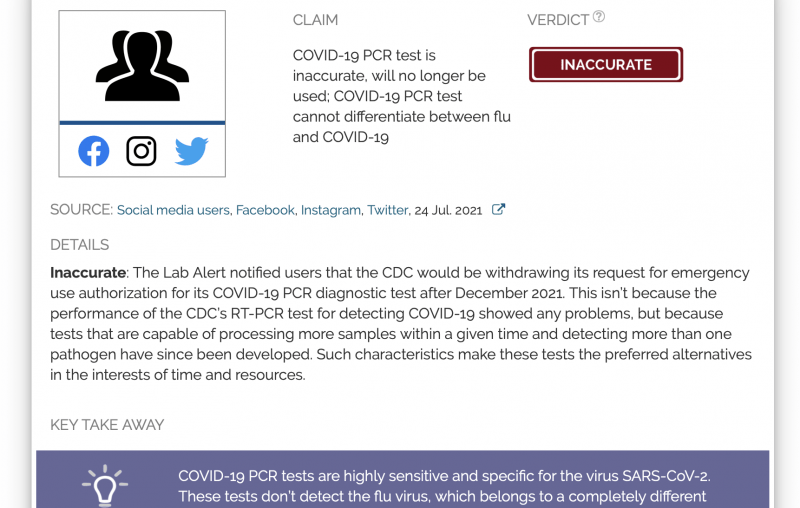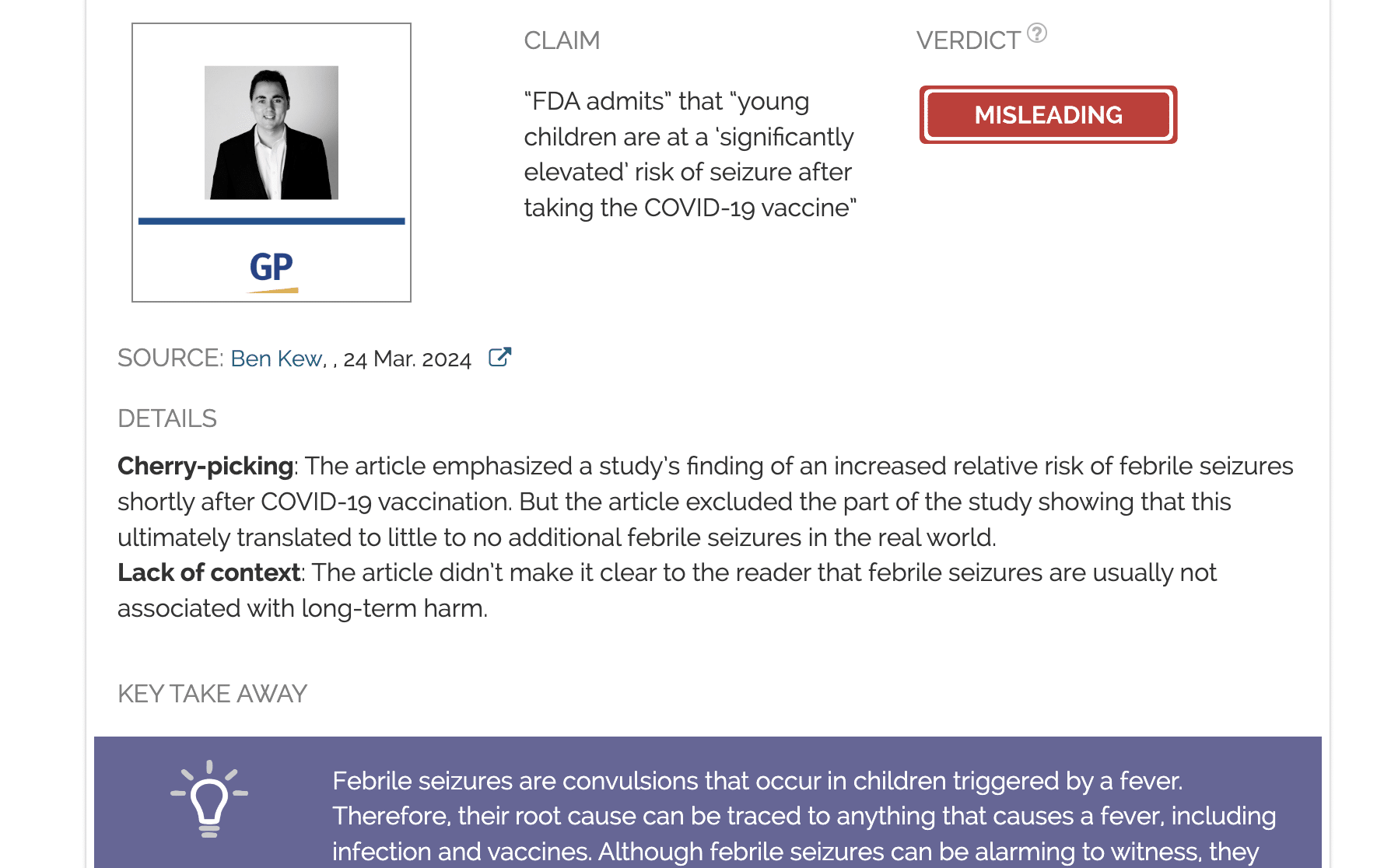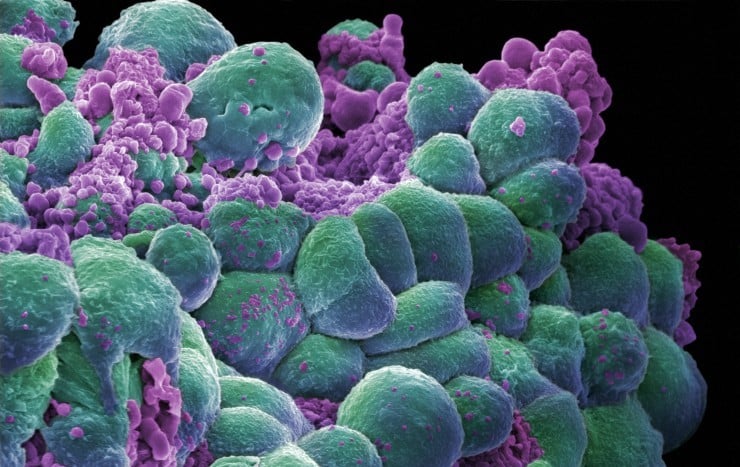- Health
EUA withdrawal for CDC COVID-19 PCR test is due to the development of newer tests that help save time and resources, not because the test is faulty
Key takeaway
COVID-19 PCR tests are highly sensitive and specific for the virus SARS-CoV-2. These tests don’t detect the flu virus, which belongs to a completely different family of viruses. The U.S. Centers for Disease Control has decided to discontinue support for its COVID-19 PCR tests due to the development of new diagnostic tests capable of processing more samples at a given time and detecting multiple pathogens including SARS-CoV-2. These new tests will help save time and resources.
Reviewed content

Verdict:
Claim:
COVID-19 PCR test is inaccurate, will no longer be used; COVID-19 PCR test cannot differentiate between flu and COVID-19
Verdict detail
Inaccurate: The Lab Alert notified users that the CDC would be withdrawing its request for emergency use authorization for its COVID-19 PCR diagnostic test after December 2021. This isn’t because the performance of the CDC’s RT-PCR test for detecting COVID-19 showed any problems, but because tests that are capable of processing more samples within a given time and detecting more than one pathogen have since been developed. Such characteristics make these tests the preferred alternatives in the interests of time and resources.
Full Claim
COVID-19 PCR test is inaccurate; COVID-19 PCR testing will no longer be used; COVID-19 PCR test cannot differentiate between flu and COVID-19
Review
COVID-19 PCR tests have been a critical tool for identifying infections and reducing the spread of the virus by supporting contact tracing efforts and quarantine of infected individuals. But this key role has also turned it into a hotbed of misinformation, as those opposing public health measures like mask-wearing, lockdowns, and vaccination seek to discredit the test in order to cast doubt on the severity of the pandemic and in turn the necessity of implementing such measures. Claims related to COVID-19 PCR testing were previously addressed by Health Feedback here, here, and here.
Another claim running along the same theme took advantage of a 21 July 2021 Lab Alert issued by the U.S. Centers for Disease Control and Prevention (CDC)’s Center for Surveillance, Epidemiology, and Laboratory Systems. In brief, the Lab Alert had announced:
“After December 31, 2021, CDC will withdraw the request to the U.S. Food and Drug Administration (FDA) for Emergency Use Authorization (EUA) of the CDC 2019-Novel Coronavirus (2019-nCoV) Real-Time RT-PCR Diagnostic Panel, the assay first introduced in February 2020 for detection of SARS-CoV-2 only”.
This was then interpreted by some as a validation of earlier false claims that COVID-19 PCR testing is inaccurate (see example). Still others claimed that the COVID-19 PCR test cannot differentiate between SARS-CoV-2 and the flu virus, citing this statement in the Lab Alert: “CDC encourages laboratories to consider adoption of a multiplexed method that can facilitate detection and differentiation of SARS-CoV-2 and influenza viruses”.
Other social media users also circulated a doctored image (see example), combining the header of the CDC Lab Alert with the contents of an inaccurate article claiming the U.S. Food and Drug Administration announced the CDC’s COVID-19 PCR test “failed full review”. For many users, this made it appear as if it was an official message by the CDC. However, this claim bears no resemblance to the contents of the original Lab Alert.
In total, these claims received tens of thousands of interactions on multiple social media platforms, including Facebook, Instagram, and Twitter, with political commentator Candace Owens and former U.S. Representative Robert Fraser among those sharing such claims. Notably, both shared a tweet by the group U.K. Medical Freedom Alliance. That tweet has since been deleted but has been archived here.
In an email to Health Feedback, CDC spokesperson Jasmine Reed explained the reason for the withdrawal:
“Given the availability of commercial options for clinical diagnosis of SARS-CoV-2 infection, including multiplexed and high-throughput options, CDC intends to discontinue support for the CDC 2019 Novel Coronavirus (2019 nCoV) Real-Time RT-PCR Diagnostic Panel, the assay first introduced in February 2020 for detection of SARS-CoV-2.
Although the CDC 2019 Novel Coronavirus (2019 nCoV) Real-Time RT-PCR Diagnostic Panel met an important unmet need when it was developed and deployed and has not demonstrated any performance issues, the demand for this test has declined with the emergence of other higher-throughput and multiplexed assays. CDC is encouraging public health laboratories (PHL) to adopt the CDC Influenza SARS-CoV-2 (Flu SC2) Multiplex Assay to enable continued surveillance for both influenza and SARS-CoV-2, which will save both time and resources for PHL.”
In other words, the performance of the CDC’s RT-PCR test for detecting COVID-19 didn’t suffer from any problems. However, tests that are capable of processing more samples within a given time (higher-throughput) and detecting more than one pathogen (multiplex) have since been developed, and as such, are the preferred alternatives in the interests of time and resources.
It should be noted that the Lab Alert only pertains to the CDC’s own COVID-19 diagnostic PCR test, specifically the 2019-nCoV Real-Time RT-PCR Diagnostic Panel—it has no bearing on other COVID-19 PCR tests developed by other parties, of which there still remain many under Emergency Use Authorization (EUA), according to the U.S. Food and Drug Administration (FDA)’s website. Therefore, it is false to claim, as some did, that the Lab Alert means COVID-19 PCR testing in general will be discontinued.
Finally, the claim that the COVID-19 PCR test can’t distinguish between SARS-CoV-2 and the flu virus is false and was addressed in an earlier review by Health Feedback. In brief, the flu virus and the coronavirus SARS-CoV-2 belong to completely different families of viruses. The COVID-19 PCR test specifically detects the presence of the genetic material from SARS-CoV-2. The genetic sequence of the flu virus is different from the SARS-CoV-2 virus and wouldn’t be detected by a COVID-19 PCR test.
Overall, these false claims about COVID-19 PCR testing are repetitions of already-debunked claims about the accuracy of the test, based on embellishments of an official CDC communication that aren’t rooted in scientific evidence.
UPDATE (29 July 2021):
This review was updated to discuss an example of a doctored image circulated by some social media users that falsely made it appear as if an official CDC communication showed the CDC’s PCR test “failed full review”.



